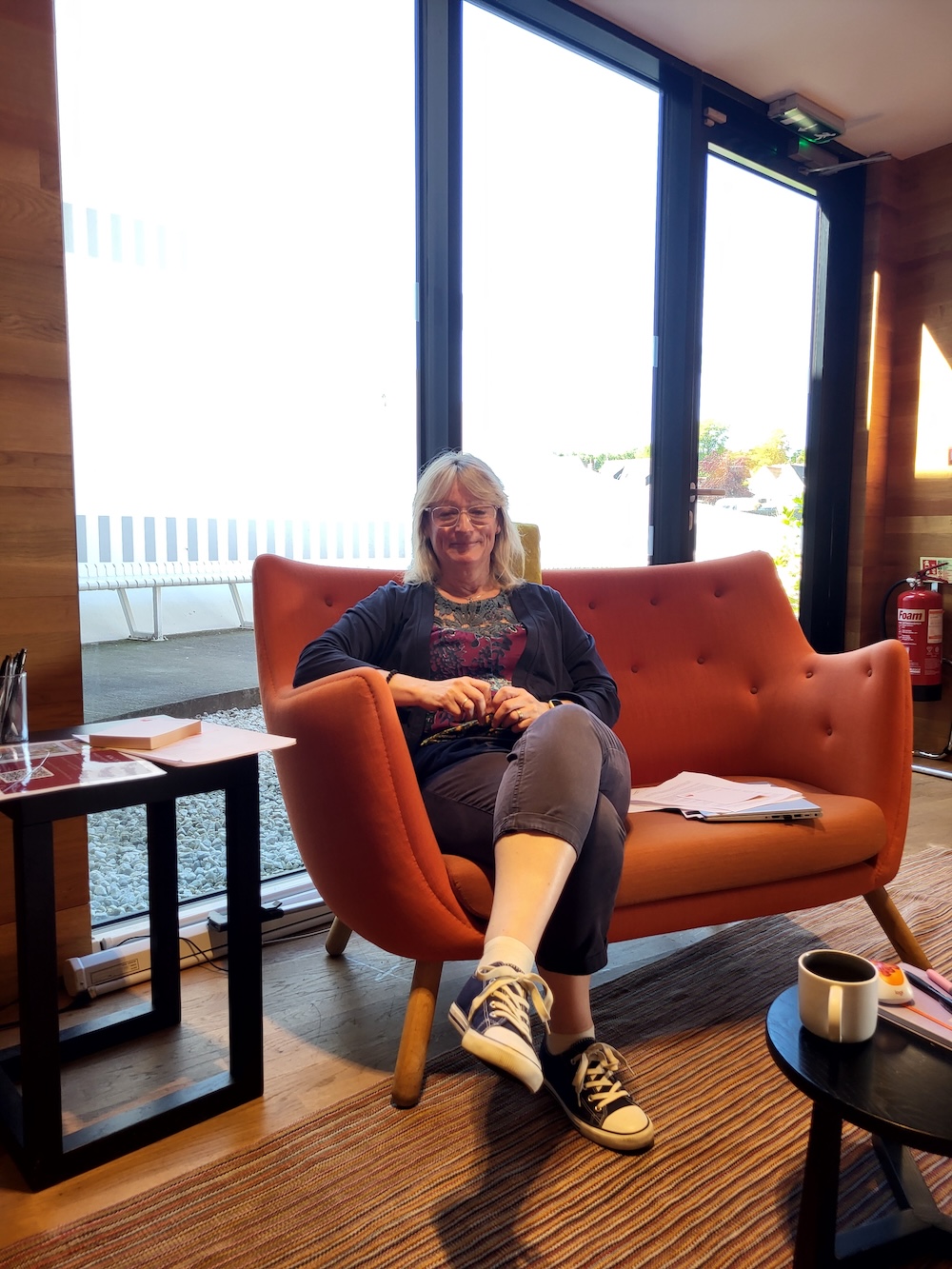In the Grampian region, patients need to get their general practitioner to OK screening for prostate cancer and typically wait more than 84 days to start treatment
ABERDEEN, U.K.—It was a conversation that saved Richard Donaldson’s life.

Image provided
He mentioned to a friend he’d been peeing more recently and she told him a similar thing happened to a man she knew with prostate cancer.
If it wasn’t for a series of tests from his general practitioner, he never would have known he had prostate cancer. If it wasn’t for a prostatectomy, the disease could have spread to his bones, vastly increasing the chances of it becoming fatal.
Donaldson, a creel fisherman from Aberdeenshire in eastern Scotland, said he’d never heard of prostate cancer before his diagnosis. He was 54 at the time, nearly 20 years younger than the typical patient with that form of cancer. In the U.S., doctors advise men of average risk to get prostate exam at 50; those at higher risk are typically told to test at 45.
Donaldson asked his general practitioner for the test. After two PSA tests, which scans blood for a prostate-specific antigen, a bone scan, an MRI and a biopsy, Donaldson was told through a video call that he had prostate cancer.
“It felt like I was walking through a dream,” Donaldson said.
Although he once didn’t even know what the disease was, Donaldson later learned that prostate cancer is the most common cancer for men, with an estimated 1 in 10 diagnosed in their lifetime.
Worldwide it’s the second most common cancer, with an estimated 1.5 million cases a year. When caught early, doctors can successfully treat the cancer, with more than 99% of patients meeting a five-year survival rate.
However, when the cancer spreads past a patient’s pelvis and becomes metastatic, that survival rate drops to 32%.
According to the latest National Prostate Cancer audit from 2022, 35% of men in Scotland diagnosed with prostate cancer were diagnosed at stage IV, meaning the disease had spread. These numbers are also the worst in the United Kingdom. In comparison it’s 12.5% of men in London.
But in Scotland, which has a universal healthcare system run by the government, a lack of both awareness from men and a standardized screening program for prostate cancer appear to be leading to more late-stage diagnoses. When all citizens have access to care, wait times can also be a factor, as they were for Donaldson.
After he asked to be screened, it would be another 10 months until he would receive his treatment. With his first PSA test, he scored a 39 on the antigen measurement, which translates to a roughly 50% chance of having prostate cancer.
He then had to wait two weeks to take another. He scored a 38. After that, he was referred to urologists in Aberdeen to be given an MRI. They found a small bulge in his prostate. Then they gave him a bone scan to see if it had spread. It hadn’t. Finally, they performed a biopsy on the bulge.
Two months went by without hearing anything.
Then the video call came.
“Getting told through the video wasn’t really good. Your brain just goes into meltdown because they speak about Gleason scores and PSA tests and radio and hormones. … You’re listening to what the guys say, and you’re not really taking everything in,” he said. “It’s quite horrific.”
Donaldson said the hardest part was the decision that they left him with. He could either go through radio-hormone therapy or get his prostate removed with a prostatectomy.
“You’re walking about in life, enjoying your life, your family, doing your job, blah, blah, blah. Then you’re thrown down this rabbit hole, making decisions about your life,” Donaldson said. “It’s really bad in your mental state.”

Photo: Corbin Vanderby
Mary Ogilvie, a cancer support specialist at Maggie’s Aberdeen, a charity and support group for cancer patients, said that this moment is particularly difficult. The radio-hormone therapy uses radiation to kill off cancer cells and also lowers testosterone to help slow the growth of new cells.
Once a patient undergoes radio-hormone therapy, the tissue of the prostate becomes scarred, making a prostatectomy more difficult if the cancer comes back. And both come with side-effects.
Prostatectomy can cause erectile dysfunction, urinary incontinence and sometimes changes in ejaculation. Ogilvie said that this is often a major consideration for men trying to preserve their relationship.
Hormone radio-therapy can also have many side-effects, like reduced sex drive, increased sweating, weight gain, mood swings, breast swelling, fatigue and bowel and urinary issues.
For Donaldson, he made his decision after talking with a radiotherapy specialist who told him that he’s too young for the treatment.
“When they hit you with radio and hormone treatment, it takes your testosterone level down to zero, so that you’re walking about like a 70-year-old man,” Donaldson said. “I did not want to walk about like a zombie.”
After the 10 months of waiting, Donaldson had his prostatectomy in April of 2024.
In the Grampian region of Scotland, which includes Aberdeen, wait times for prostate cancer treatment are at their highest, with 75% of patients waiting more than 84 days to start treatment.
For Donaldson, the wait time is not what he thinks about now. It’s the lack of screening.
Donaldson said that it was the PSA test that saved his life and if he hadn’t asked for it, it’s possible his cancer could have spread.
For now, patients must ask their general practitioners to be tested. Donaldson said he believed that a screening program should be implemented, especially with what he sees as the lack of awareness of the disease.
The National Health Service-Scotland has said that it will not implement a screening program, as the PSA tests are not considered reliable enough. The reason for this is that the amount of the specific antigen in one’s blood can be affected by things other than prostate cancer, including urinary tract infections. However, PSA tests are usually followed up with MRI’s and biopsies, meaning mistreatment can be avoided if the PSA test is off.
Prostate Scotland, a charity organization supporting people with prostate cancer, is also funding research for the development of a new screening process using ultrasound technology. It’s currently in early clinical trials.
The researchers at Heriot-Watt University in Edinburgh have said the trial has a 94% sensitivity rate to tumors and only takes 20 minutes to complete.
“In Scotland, we have screening for breast cancer, we have screening for cervical cancer, we have screening for bowel cancer, but there is, at this stage, no prostate cancer screening,” said Elaine Stewart, service development manager at Prostate Scotland. “It’s something that Prostate Cancer UK are looking into, but at the moment, we don’t have a test that is accurate enough to have as a screening test.”
Lithuania is the only country in Europe that routinely screens men with PSA tests. When Lithuania first implemented the routine tests in 2006, prostate cancer became a lot more common but it also found that from 2006-2009, around 61% were diagnosed in early stages of cancer.
Compounding the issues: Prostate cancer typically has few clear symptoms, making it hard for people to know when to get checked. For Donaldson, he said he noticed he’d been peeing more at night, but just chalked it up to his age.
For others, they might find blood in their urine or semen, have pain while urinating or have a weak flow.
But regardless of the treatment, experts and survivors say often the cruelest side effects are the depression and physical exhaustion those in treatment often face.
For Donaldson, the surgery made him incontinent, meaning he could not control his bladder and had to have a catheter in for a week.
“I think mental health is a huge thing when it comes to prostate, because you’re dealing with your manhood,” Donaldson said. “You lose your confidence a wee bit, because you’re going out to restaurants and stuff like that, and you’re carrying, like, basically pads with you.”
Donaldson also said his fatigue affected his everyday life, comparing it to a sledgehammer smacking him in the head.
He found his solution in support groups and exercise.

Photo: Corbin Vanderby
One of the places he found support was at Maggie’s Aberdeen. The facility sits surrounded by the sprawling campus of the Aberdeen Royal Infirmary, a series of hospitals in the eastern Scotland town. But Maggie’s is different.
Ogilvie said that the center in Aberdeen is designed to be the least clinical as possible with warm natural lighting and rustic undertones. The center also doesn’t have appointments, as people are free to walk in whenever. Ogilvie said usually someone will greet them at the door, offer them a coffee or tea and then have a conversation.
It is part of the mission of Maggie’s, which was founded by Maggie Jencks, a writer and garden designer who was diagnosed with breast cancer. When she was told the news in a windowless corridor, she realized that cancer patients needed a better place to process the information.
Once the cancer support specialists get to know the patient a bit better, then they find a group they think would be a good fit.
For Donaldson, he said his involvement with Maggie’s allowed him to talk to other people who understood and help him focus on his mental health.
“I think people who are not attending groups are suffering in silence,” Donaldson said. “You’ve got to be able to speak to people about how do they do it? What do they do when they come to the hospital? There’s loads of information out there, but if you’re not attending groups, you’ll never know.”
Ogilvie said that opening up and taking care of mental health has to be a priority, specifically when it comes to prostate cancer.
“Some men can be quite stoic and keep it to themselves and just get through treatment. But coming here is a safe space, you know, so they might feel like keeping this mask on, but when they come here, they can take the mask off, because that mask can get pretty heavy,” Ogilvie said.
Maggie’s also hosts fundraising events like runs, walks and cycling races to pay for the upkeep and building of its centers and programs. In 2023 Maggie’s, which operates eight care centers in Scotland, raised £32 million, or nearly $43 million.
To help with the physical side of his fight, Donaldson joined a program called Football Fans in Training. The program run by Prostate Scotland takes men with prostate cancer to Pittodrie Stadium, the 20,000-seat football stadium in Aberdeen, to exercise, eat healthy and make friends.
Stewart, the service development manager for Prostate Scotland, said the program’s main goal is to help men get fit, which then increases overall health and can lead to better outcomes in treatment.
The idea started because the group knew it was hard to get men interested in going to programs like WeightWatchers or get excited about general exercise, so they decided to work with the Scottish Professional Football League to provide incentive to sport fans.
The 12-week program begins with getting diagnostics on each participant, things like their blood pressure and their body mass index. Then over the 12 weeks, they do a combination of workout routines, in-class learning about healthy eating and living and playing football. At the end of the class, they take the diagnostics tests again, and Stewart said there often is a measurable difference. Stewart also said what people most enjoy is being around others with prostate cancer.

Image provided
“The majority of the feedback we get is around the camaraderie of it and getting to speak to people in the same boat. That’s definitely the key theme I would say,” Stewart said.
For Donaldson, he said the program helped him stay fit and feel less fatigued, as well as make some new friends.
“It’s really meant a lot to me because it’s like 16 guys and you’re all in the same boat,” Donaldson said. “It shows how to keep fit, but not in a really big gym, it’s like, just get moving, because your motivation is so, so low after a major operation. You can’t be bothered to go and walk a lot and do stretches. But it really helps your motivation.”
Now Donaldson’s most recent PSA test had a result of 0.025, which indicates the cancer has been fully eradicated. But Donaldson continues to battle prostate cancer in his way, now using his experience to try and spread awareness of the disease. Donaldson just recently began his own support group, which had its first meeting with 10 attendees at the Peterhead Football Club.
And he continues to call for mandatory PSA tests for all Scottish men over 50.
“For a simple prick in your arm, you can save a man’s life, save a dad’s life,” Donaldson said. “And it saved my life.”
This story is part of a healthcare series produced by the International Reporting program at the University of Montana School of Journalism. Read more from this Scotland-based project, as well as reports from other countries, at Montana Journalism Abroad.